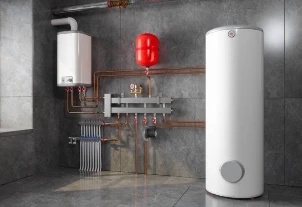In today\'s world, where energy efficiency and sustainability are paramount concerns, heat-only boilers have emerged as reliable heating solutions for various settings. These boilers, also known as conventional or regular boilers, offer efficient heating without the complexity of additional features found in other boiler types. Let\'s delve into what heat-only boilers are, how they work, and why they are gaining popularity.
What is a Heat-Only Boiler?
A heat-only boiler is a type of central heating system that provides hot water for both domestic use and space heating. Unlike combination boilers, which heat water on demand, heat-only boilers store hot water in a cylinder or tank, ready for use when needed. They work by heating water and circulating it through radiators or underfloor heating systems to warm up indoor spaces.
Advantages of Heat-Only Boilers
Energy Efficiency
One of the primary advantages of heat-only boilers is their energy efficiency. By heating water in advance and storing it in a cylinder, these boilers minimize energy wastage and ensure a constant supply of hot water whenever needed.
Cost-Effectiveness
Heat-only boilers are often more cost-effective than other types of boilers, especially in properties with existing heating systems. Their simple design and ease of installation translate to lower upfront costs for homeowners and businesses.
Compatibility with Renewable Energy Sources
Another notable advantage of heat-only boilers is their compatibility with renewable energy sources such as solar thermal panels. By integrating with sustainable heating solutions, these boilers contribute to reducing carbon emissions and promoting environmental sustainability.
Types of Heat-Only Boilers
There are several types of heat-only boilers available in the market, including:
Conventional Boilers
Conventional boilers, also known as regular or traditional boilers, work with a cold-water storage tank and a separate hot water cylinder. They are suitable for properties with high hot water demands and existing heating systems.
System Boilers
System boilers incorporate the heating and hot water components into a single unit, eliminating the need for a separate cold-water storage tank. They are compact and ideal for properties with limited space.
Regular Boilers
Regular boilers operate with a separate hot water cylinder and cold-water storage tank, similar to conventional boilers. They are suitable for larger properties with high hot water demands.
Installation Process
Installing a heat-only boiler requires careful planning and consideration. Here are some key steps in the installation process:
Choosing the Right Boiler Size
Selecting the appropriate boiler size is crucial to ensure optimal performance and efficiency. Factors such as property size, hot water demand, and heating requirements should be taken into account.
Hiring a Professional Installer
It\'s essential to hire a qualified and experienced installer to handle the installation process. Professional installers have the expertise and knowledge to ensure the boiler is installed correctly and safely.
Installation Considerations
During installation, factors such as location, ventilation, and pipework layout need to be considered to ensure efficient operation and compliance with building regulations.
Maintenance and Care
To maintain optimal performance and prolong the lifespan of a heat-only boiler, regular maintenance is essential. Here are some maintenance tips:
Regular Servicing
Schedule annual servicing by a qualified engineer to inspect and maintain the boiler components, identify any potential issues, and ensure safe operation.
Monitoring for Efficiency
Monitor the boiler\'s efficiency by checking energy consumption and heating performance regularly. Adjust settings as needed to optimize efficiency and reduce energy costs.
Troubleshooting Common Issues
Be proactive in addressing common boiler issues such as leaks, pressure drops, and heating failures. Prompt troubleshooting can prevent further damage and costly repairs.
Comparison with Other Boiler Types
Heat-Only vs. Combination Boilers
Unlike heat-only boilers, combination boilers heat water on demand, eliminating the need for a separate hot water cylinder. While combi boilers are more compact and space-saving, they may not be suitable for properties with high hot water demands.
Heat-Only vs. Condensing Boilers
Both heat-only and condensing boilers are efficient heating solutions, but condensing boilers are designed to recover heat from exhaust gases, further improving energy efficiency. However, heat-only boilers remain a viable option for properties with existing heating systems.
Environmental Impact
Heat-only boilers play a significant role in reducing carbon emissions and promoting environmental sustainability. By integrating with renewable energy sources and implementing energy-efficient practices, they contribute to a greener future.
Applications in Different Settings
Heat-only boilers are versatile heating solutions suitable for various settings, including:
- Residential buildings
- Commercial properties
- Industrial facilities
Their flexibility and reliability make them ideal for both small-scale and large-scale applications.
Future Trends in Heat-Only Boiler Technology
As technology advances, heat-only boilers are expected to evolve to meet the growing demand for energy efficiency and sustainability. Future trends may include:
- Advancements in efficiency through innovative design and materials
- Integration with smart home systems for remote monitoring and control
- Continued development of sustainable heating solutions to reduce environmental impact
Conclusion
Heat-only boilers offer efficient and cost-effective heating solutions for residential, commercial, and industrial settings. With their simplicity, reliability, and compatibility with renewable energy sources, they play a vital role in promoting energy efficiency and sustainability. As technology advances, heat-only boilers are expected to continue evolving to meet the changing needs of modern heating systems.


